The Value of Health































































































































































































































What does a strong workplace culture look like for you?
This spring, as Duke eased out of the pandemic, we asked you to answer that prompt through a questionnaire in the “Working@Duke This Week” e-newsletter. We received nearly 600 responses ranging from diversity and belonging to work flexibility and bonds with colleagues.
Examples also highlighted fun ways colleagues forge connections with each other.
For example, Jennifer Hall, nurse manager of operations for the Pre-Anesthesia Surgical Screening Clinic, invited the 70 members in her clinic to send her their baby picture. Nearly 40 colleagues shared snapshots, which were displayed on a bulletin board for three weeks for team members to guess their colleagues’ baby photo. A lucky staff member who guessed the most correct – 30 – received a gift card.

“People would go up to the board and stand there for 10 minutes, looking and talking with each other,” Jennifer said. “It turned out wonderful.”
On pages 10-11, we’re kicking off a new series, “Forward Together,” which illustrates examples of how staff and faculty are sticking together amid change brought on by COVID-19.

In its 2022 Global Talent Trends report, “The Reinvention of Company Culture,” LinkedIn found that 63 percent of professionals list work-life balance and 40 percent cite colleagues and culture as top priorities when picking a new job.
“Duke is often recognized among the best places to work nationally," said Antwan Lofton, interim vice president for Duke Human Resources. “We’re known for how we invest in the well-being and success of our employees, which, in turn, fosters an innovative workforce that others look to as a model. Now, more than ever, it’s vital that we work together to foster a culture of trust and connection that builds on our strong foundation.”
As the post-pandemic landscape evolves, share examples of how your area fosters a strong culture, as well as ideas for how Duke can continue this important dialogue. Send email to working@duke.edu
With open enrollment for medical, dental and vision coverage from October 17 to October 28, colleagues share how their Duke health insurance benefit saved them from a health and financial crisis.
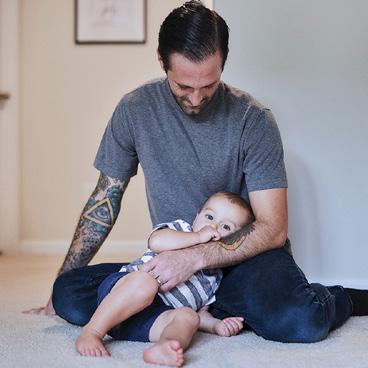
Get involved in Blue Devil Toastmasters, PRATTically Speaking Toastmasters, and Duke Toastmasters Club.

As the post-pandemic workplace evolves, staff and faculty are fostering a strong culture amid change.
Working Toward Racial Justice: Mapping Duke’s equity resources
lives across North Carolina
Contact us
Editor/Executive Director of Communications: Leanora Minai (919) 681-4533 leanora.minai@duke.edu
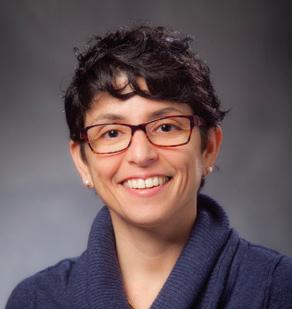

Assistant Vice President: Paul S. Grantham (919) 681-4534 paul.grantham@duke.edu

Graphic Design & Layout: Paul Figuerado (919) 684-2107 paul.figuerado@duke.edu
Stephen Schramm Senior Writer (919) 684-4639 stephen.schramm@duke.edu
Visit Working@Duke daily on Duke Today: working.duke.edu
Jack Frederick Writer (919) 681-9965 jack.frederick@duke.edu
Working@Duke is published quarterly by Duke’s Office of Communication Services. We invite your feedback and story ideas. Send email to working@ duke.edu or call (919) 681-4533.
2017, 2014 Gold, 2019, 2015, 2013, Silver, 2016, 2009, 2007 Bronze, Print Internal Audience Publications and 2012, 2011, 2009, 2008, 2007 Gold Medal, Internal Periodical Staff Writing

Staff and faculty of Duke University and Duke University Health System can support worthy community causes through Doing Good, Duke’s annual employee giving campaign. The campaign, which provides financial support to a variety of area schools, non-profits and/or the United Way of the Greater Triangle, has a goal of raising $650,000 during this fiscal year.
Employees can select the kind of need they’d like their taxdeductible donation to address by choosing among six areas: housing and neighborhoods, health, education, employment, communities, and the United Way of the Greater Triangle. Employees can donate at any time using the Duke@Work portal to make a one-time donation or set up regular contributions through payroll deductions.
During the 2020-21 campaign, employees raised $526,407.01 for local nonprofits, schools, and neighborhoods.
“When Duke employees give together, we send a unified message that we support the communities in which we live and work,” said Domonique Redmond, assistant director of strategic initiatives and planning for Duke’s Office of Durham and Community Affairs.
For more information, visit doinggood.duke.edu

It’s not too late to squeeze in some learning before the end of the calendar year. Sharpen your leadership, communication, and tech skills with courses from Learning & Organization Development (L&OD), a unit in Duke Human Resources.

There are
26 mostly virtual courses available in October, November, and December, including popular offerings such as an introduction to Microsoft Excel (Nov. 1); Building Resilience (Nov. 7); and Managing Multiple Priorities (Dec. 12).
“Now is the time for people to reengage and re-ignite in their professional development,” said Keisha Williams, Duke’s assistant vice president for L&OD. “There are a wealth of resources out there for people to tap into in our learning space.”
Find L&OD’s schedule at duke.is/9rk3x
Stay healthy and fit between Thanksgiving and the new year with “Maintain Don’t Gain,” which runs Nov. 14 to Jan. 8.
Making its return for the first time since the start of the pandemic, the eight-week challenge program will help staff and faculty lose or maintain weight through the holiday season with weekly emails that include stress management tools, workout suggestions, and healthy lifestyle tips from LIVE FOR LIFE, the employee wellness program. Registration begins Oct. 31.
“People may forget or feel that the holidays don’t matter about their health, and they’ll get back into it in January,” said Tim Bisantz, Fitness Program Manager for LIVE FOR LIFE. “You can start your New Year’s resolution in November and use this program as a baseline to maintain your weight, stay active and give yourself a springboard into those New Year’s goals.”
Throughout the program, LIVE FOR LIFE will offer tailored fitness consultations to help you reach exercise goals. Staff will also supply information to help you track weight, as well as tips for staying active in cold weather. Participants can earn LIVE FOR LIFE dollars – Monopoly-like money to buy items in the LIVE FOR LIFE store – by losing or maintaining their weight (3-pound margin) during the holiday season.
The last time the program ran in 2019, 854 employees participated and lost a combined 2,237 pounds.

Register: hr.duke.edu/maintain
Duke continues to offer booster shots of the newly reformatted COVID-19 vaccine that provides greater protection against the omicron variant of COVID, including BA.4 and BA.5 subvariants.

The Pfizer bivalent booster that first began being administered on campus in September protects against severe illness and is expected to limit the spread of the virus in the community during the fall and winter months.
“If you have waited to get a booster shot, this is the time to get it,” the co-leaders of the COVID-19 Vaccination Planning Work Group said in an announcement to the Duke community. “Broad vaccination with this new booster can make a significant difference in finally getting to the other side of this pandemic.”
Appointments are available for eligible staff, faculty, and students through Duke’s COVID Vaccine website [covidvaccine.duke.edu].
Appointments for the Pfizer COVID-19 bivalent booster are updated on the website as shipments become available. Faculty and staff are also encouraged to explore other vaccine options such as local pharmacies or healthcare providers.
One morning in June 2018, Gordon Wang walked to the J.B. Duke Hotel, he assumed, to provide support for a Weekend Executive MBA class, something he hadn’t done in months.
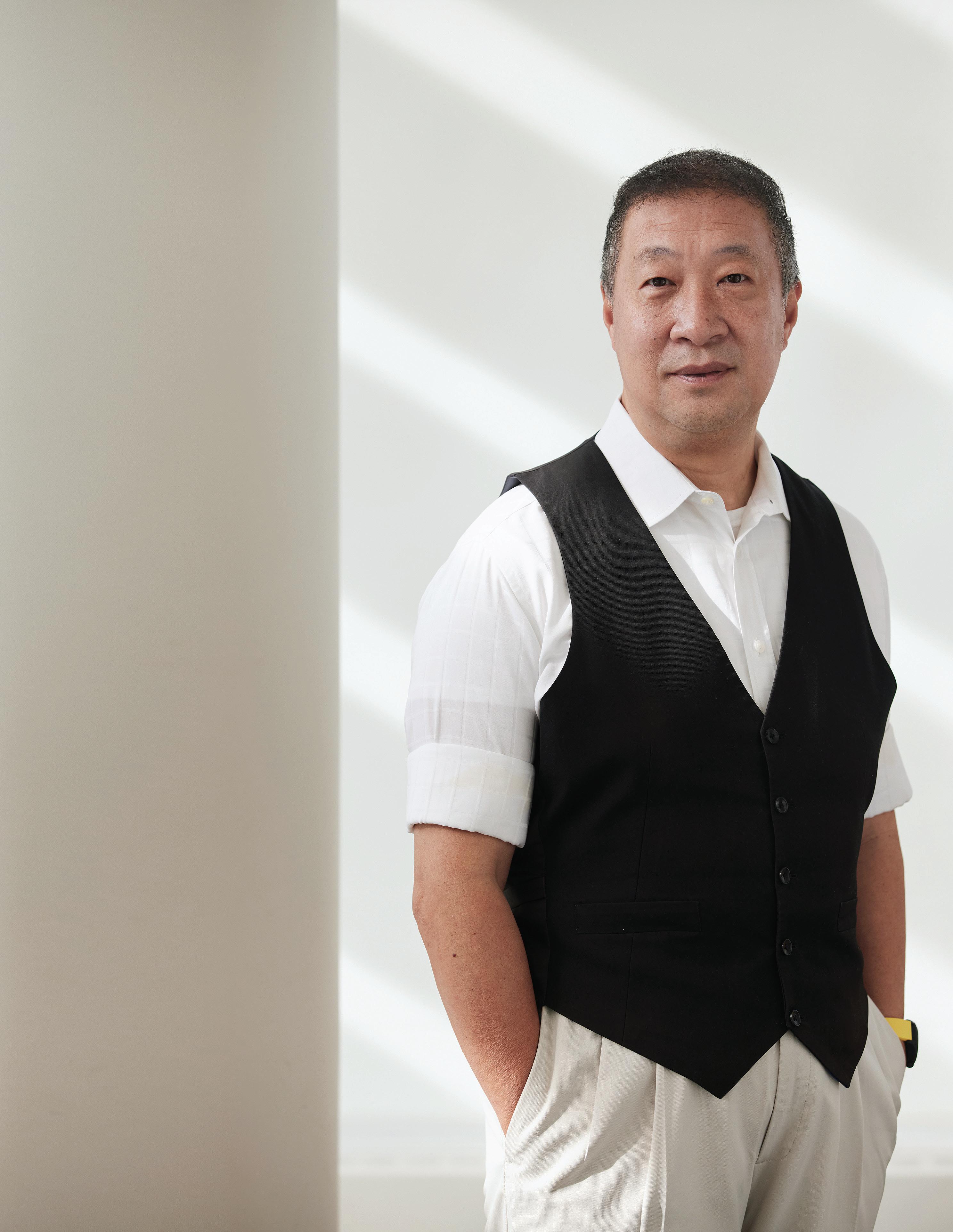
Once there, he was greeted by smiling colleagues and students and a banner: “Welcome Back Gordon 2.0!!!”
Overwhelmed with gratitude, Gordon, who months earlier was fighting for his life, couldn’t form words. All that came were tears.
The previous summer, doctors diagnosed Gordon, an IT analyst for the Fuqua School of Business, with a rare autoimmune disorder and discovered a tumor on his thymus gland. He spent the next three months hospitalized, enduring multiple surgeries, three weeks in intensive care, and several rounds of radiation treatment.
Once home in Durham, Gordon, in his early 50s, needed months of physical therapy to walk again. Without family nearby, his colleagues at Fuqua, where he’s worked since 1996, became one. They took turns mowing his lawn, organized a blood drive in his honor, and delivered months of home-cooked meals like barbecue and spaghetti and meatballs.
“Not many people go through experiences like this,” Gordon said. “I was incredibly lucky.”
He lost count of exact figures but knows his hospital stay in 2017 cost more than $1.5 million. With his insurance plan through Duke, he only paid a $600 co-pay for the inpatient admission.
“I was afraid that I was going to be hit with some bill that would wipe out my savings,” he said. “This saved my financial life.”
In the wake of inflation and the COVID-19 pandemic, Duke’s employee medical insurance plans safeguard physical
During three months in the hospital in 2017, Gordon Wang leaned on his Duke employee health coverage and friends at the Fuqua School of Business.

How Duke’s medical benefits protect physical and financial well-being
and financial health and protect what matters most. Staff and faculty medical plans remain exceedingly popular, as around 90 percent of eligible individuals choose to enroll, higher than the 77 percent average for employers in education, according to the Bureau of Labor Statistics.
In the past fiscal year, Duke paid $302 million for health concerns of participants, up $14 million from the previous year. That includes $25 million for cancer treatments, the third largest category for spending. The largest was musculoskeletal concerns, which include arthritis.
In 2023, insurance premiums remain competitive among peers with monthly premiums for Duke’s most popular plan, Duke Select, rising $5 for individuals and $31 for families.

Stephanie Roberson stood at the CVS Pharmacy counter with an impossible decision to make in 2018. A Type 1 diabetic since age 6, she started to cry.
She couldn’t afford rent, groceries, and a weekly supply of insulin, which cost $300 through her former employer’s insurance plan. She explained her predicament to the pharmacist, a stranger who paid for half of the prescription.
“I often had to either buy my insulin and go without food or vice versa,” said Stephanie, 28. “I ended up in the hospital in diabetic ketoacidosis for five days with a 1,000-blood sugar reading because I was trying to stretch my insulin.”
That day was a breaking point for Stephanie, who had a $13,000 deductible under her former employer’s plan. She decided to search for a job with a benefit plan that prioritized a person’s health. Later in 2018, she landed a role at Duke, and she’s been enrolled in the Duke Select health plan since.
“I truly believe it saved my life, as so many people die because they can't afford their insulin and they stretch it,” said Stephanie, a financial care counselor for Duke Physical and Occupational Therapy of Knightdale.
In 2021, Duke paid $11.8 million to cover care and pharmacy costs for 4,360 staff and faculty and their dependents for treatment of diabetes.
Stephanie, who now pays $50 each month for medications, got married and was able to afford a house in Rocky Mount.
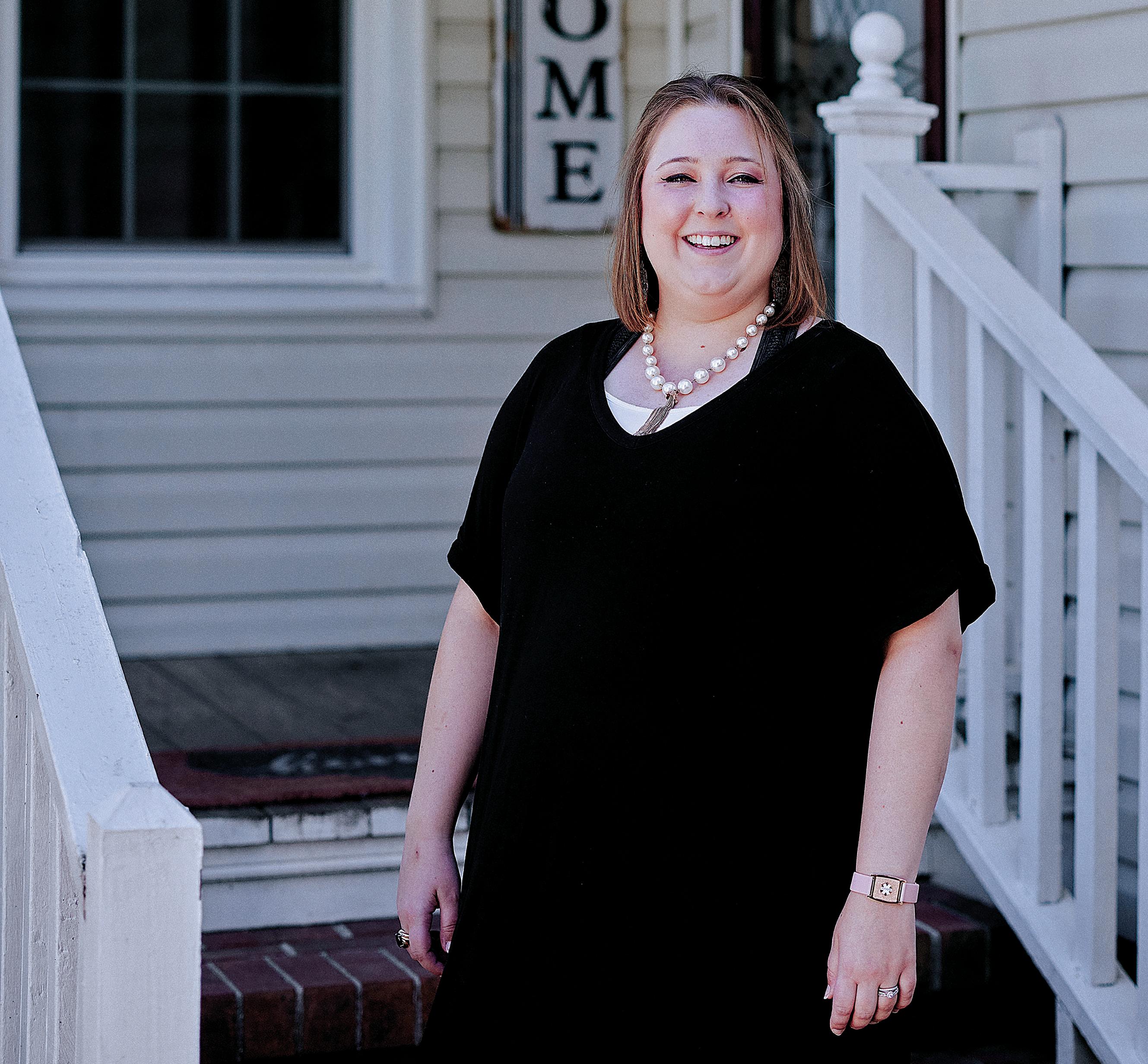
“I don't have to stress about if I should spend my money on my insulin or food,” she said. “I am thankful for Duke and the medical insurance they provide every day.”
“At Duke we’re constantly trying to ensure that our benefits plans don’t only fit the needs of planned life changes, but also support you and your loved ones when you face an unexpected event,” said Duke Interim Vice President for Human Resources Antwan Lofton. “And while we’re not charging as much as our industry peers are charging, we’re offering a benefits package that’s much richer than what our peers are offering.”
With open enrollment for medical, dental and vision coverage running from October 17 to October 28, colleagues share how their Duke health insurance benefit saved them from a health and financial crisis.

Zach Smith, a grants and contracts administrator for the Duke Heart Center, knows he’s got to keep his head on a swivel for his son, Fritz. As the youngest of three boys, Fritz, who turns 2 in December, isn’t afraid of much.

“He doesn’t know his limits,” Zach said. “You can’t sit down to enjoy a cup of coffee because he’ll try to get up on the dog crate, or the kitchen island, or climb the stairs.”
After a health scare two years ago, reining in Fritz’ wild streak is a problem his father is extremely grateful to have.
On Christmas Day 2020, Zach and his wife, Honor, noticed that three-week-old Fritz seemed especially fussy and didn’t have much of an appetite. The next morning, Fritz developed a fever, and caregivers at Duke Urgent Care Holly Springs referred him to Duke University Hospital.
Once there, doctors determined Fritz – whose fever spiked at 103.2 – had a group b strep infection, which required a week in the hospital for intravenous antibiotic treatments.
During nervous nights staying with Fritz, Zach recalled walking around the unit and wondering what faced other young patients. On parental leave from Duke, and with medical insurance he knew would cover most of the expenses, he said he was aware of how fortunate his family was.
A 2022 Kaiser Family Foundation (KFF) survey reported that 72 percent of adults with medical debt said it came from a one-time, short-term medical expense such as a single hospital visit. The cost of Fritz’ hospital stay was around $25,000. With Zach’s Duke Select insurance, they only paid a $600 hospital stay co-pay.
“In that moment, I felt very grateful to be able to have this coverage and do the kind of work I do,” Zach said.

After being uninsured at her previous employer, Keaira Pettiford stays on top of medical care through her Duke plan.
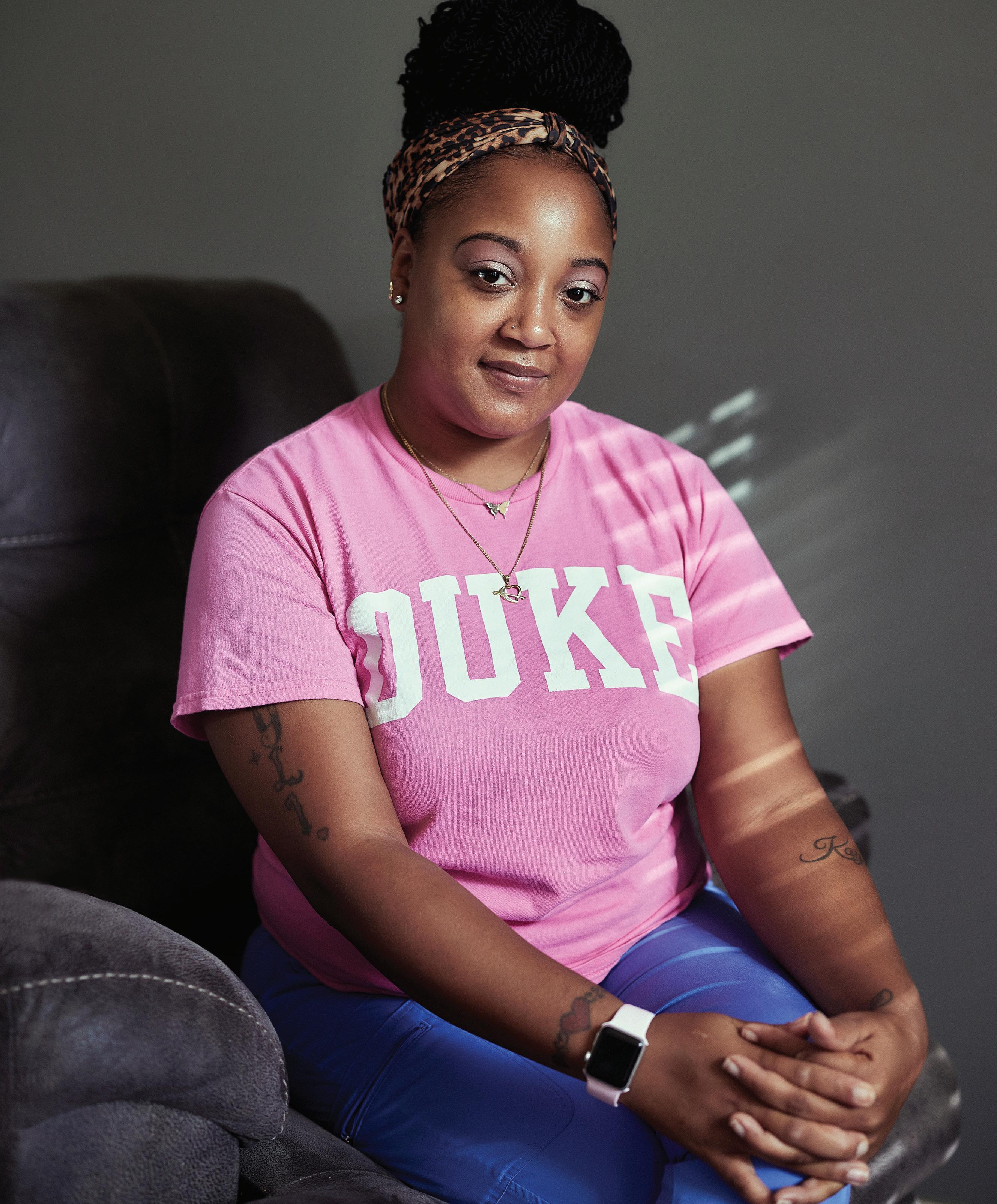
Several years ago, while driving home from work, Keaira Pettiford struggled to stay awake.
Her symptoms were concerning, but the medical plan provided by her employer at the time was not affordable, so for two years, she was uninsured.
“On so many occasions,” said Keaira, 31, “I had to ignore and push through some health problems that I experienced without seeking professional medical help because I could not afford the expenses that came along with seeing a doctor.”
According to Kaiser Family Foundation (KFF) polling, about four in 10 U.S. adults have delayed or gone without medical care in the past year due to costs.
Keaira, now a pharmacy tech for Duke Outpatient Pharmacy, is enrolled in the Duke Select medical plan and sets routine preventive care appointments to ensure she’s on the right path. Under each of Duke’s medical plans, one annual visit with an in-network provider for preventive care is fully covered. All preventive screenings are covered in full under Duke’s medical plans.
To diagnose her sudden bouts of sleepiness, she has undergone a sleep study, endoscopy, and CT scan in the past year, all at reasonable costs.
“I’m able to see a doctor for any healthcare concerns I may have and won’t have to break the bank to do it,” Keaira said. “It is an incredible feeling when you feel like you finally have control over your own healthcare.”
As she dropped her husband, Anthony, off at Duke University Hospital’s Emergency Department in 2020, Renee Hunte recalls the scene being eerily quiet. A staff member, clad in a mask and face shield, helped Anthony into a wheelchair and rolled him inside.
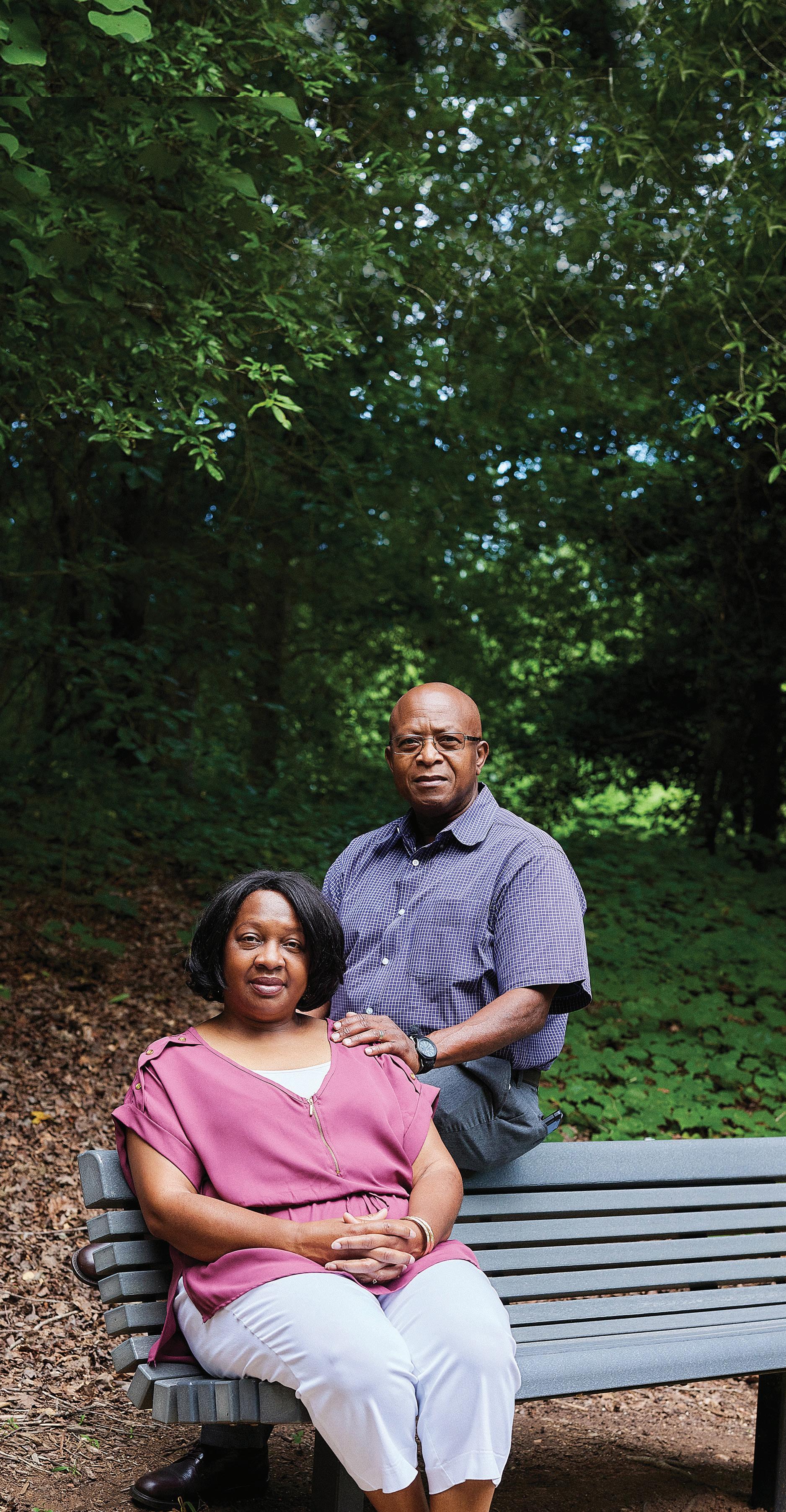
Weeks earlier, Anthony had been hospitalized with COVID-19. After being released, the virus kept taking a toll, forcing a second hospital admission, which before vaccines, was extremely worrisome.
A man of deep faith, Anthony held tight to his Bible, peaceful in his acceptance of whatever lay ahead. Nearby, Renee, who moved her family from Arkansas four months earlier to become a manager for Child Life Services at Duke University Hospital, couldn’t silence her worries.
“How am I going to raise two children by myself?” Renee thought to herself. “How am I going to do this? We just moved here.”
Duke’s employee health benefits’ deep value comes in protecting what’s truly priceless: family members. In the 2021-22 fiscal year, Duke paid $110.2 million for the health care costs of the dependents of staff and faculty members.
Over eight days, Duke caregivers helped Anthony, who was covered under his wife’s Duke Select plan, get well enough to return home, where his recovery continued.
“If I wasn’t at Duke Hospital, I wouldn’t be here, I believe that in my heart,” Anthony said. “The treatment I got was absolutely phenomenal. And afterward, I was surprised we didn’t get more substantial bills.”
By Stephen Schramm and Jack Frederick Photography by Alex Boerner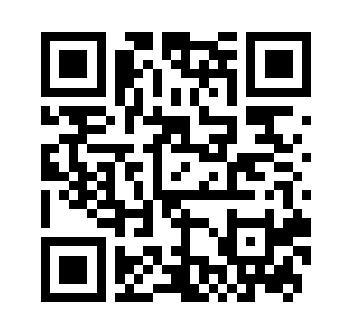
With a proven record of providing access to world class health care, while also remaining a strong value, Duke’s employee medical, dental and vision insurance plans give staff, faculty and their loved ones peace of mind.
While many employers have been forced to consider plan design changes, Duke has retained all of its current plans and coverage levels. In 2023, there are no increases in co-pays, coinsurance, or deductibles for medical, dental or vision plans.
Monthly premium increases for Duke plans in 2023, which reflect higher utilization of services by members who may have delayed care during the pandemic, remain competitive with industry peers and large employers across the nation. For Duke Select, the most popular plan, the monthly increase is $5 for individuals and $31 for families.
In the past fiscal year, Duke paid $302 million for health care needs of roughly 73,000 covered lives, up $14 million from the previous year.
Open enrollment for health benefits begins at 2 p.m. October 17 and ends at 6 p.m. October 28. Eligible staff and faculty can adjust medical, dental and vision plans and enroll or re-enroll in health and dependent care reimbursement accounts for coverage effective January 1, 2023.
Among Duke’s coverage enhancements in 2023:
Beginning in 2023, the annual benefit maximum for the Dental PPO plan will increase from $1,500 to $2,000.
Renee and Anthony Hunte have a new appreciation for time spent together after Anthony survived a scary bout with COVID-19.
Requirements for Duke Options PPO (Blue Cross Blue Shield of NC) plan members living outside the state of North Carolina have been adjusted to allow easier access to infertility and bariatric care benefits.
Personal Accident Insurance rates are decreasing in 2023. The voluntary, employee-paid program provides financial peace of mind in case of accidental death, dismemberment, or permanent disability. Eligible staff and faculty can enroll without submitting medical information.
For more details on Open Enrollment, visit hr.duke.edu/enrollment2023
Krystal Ingram turned to Toastmasters, an organization that teaches public speaking and leadership skills through a worldwide network of clubs, for help building confidence.

After being diagnosed with Spasmodic Dysphonia, a neurologic disorder that can make it difficult to talk due to spasms in vocal muscles, she was tired of feeling uncomfortable speaking.
“I’m always connecting and talking with people,” said Ingram, an administrative specialist for Dr. Jon Bae, chief quality officer for Duke University Hospital. “I’m in meetings at least once a week, with peers and senior leaders across the health system, so it’s important that you can hold your own. And it’s equally important to be comfortable in your own skin.”
Ingram, who has worked at Duke for 11 years, recently became president of PRATTically Speaking Toastmasters, one of three Toastmasters clubs affiliated with Duke. In less than
a year, a welcoming Toastmasters community helped Ingram feel more comfortable, allowing her to tackle with ease daily communicationoriented tasks such as talking on the phone, arranging meetings, and collaborating with others.

On campus, staff and faculty can get involved in Blue Devil Toastmasters, PRATTically Speaking Toastmasters, and Duke Toastmasters Club, all of which focus on the practice of prepared and impromptu speeches. For now, due to the pandemic, clubs are meeting virtually.

Run by a club president, each Toastmasters meeting follows a structured agenda, including a word of the day, joke of the day, prepared speeches, and shorter, on-the-spot speeches called “Table Topics.”
The end of a Toastmasters meeting includes time to offer a speaker feedback, including tallies on ‘umms’ and ‘ahhs’ in speeches; what went well; and gentle ways to improve. That focus on constructive feedback helped Ivo Kidze, senior IT analyst with the Office of Information Technology (OIT), change his approach to public speaking.
Kidze attended his first Toastmasters meeting in 2019 after noticing that speaking up in work meetings caused anxiety. Even though he was prepared, the anticipation of needing to present or speak made him nervous.
“I’m always working on computers, and I’m an introvert,” said Kidze, now president of the Duke Toastmasters Club. “I don’t like talking in meetings, so I wanted to improve myself.”
Kidze enjoys the process of putting together and delivering speeches, including his all-time favorite speech about what one can learn from leadership styles throughout history. He’s now on the Dynamic Leadership path, one of 11 pathways you can choose in Toastmasters. By practicing often and listening to feedback, he has learned how to be an effective communicator.
“There’s more to it than just public speaking,” he said. “I learned how to become a leader.”
By Jack FrederickRespect, encouragement, inclusion, and camaraderie contribute to a positive climate
On a Wednesday in late March, with the Duke men’s basketball team midway through its journey to the 2022 Final Four, around a dozen staff members from the Pratt School of Engineering gathered in a conference room to talk hoops and share snacks.

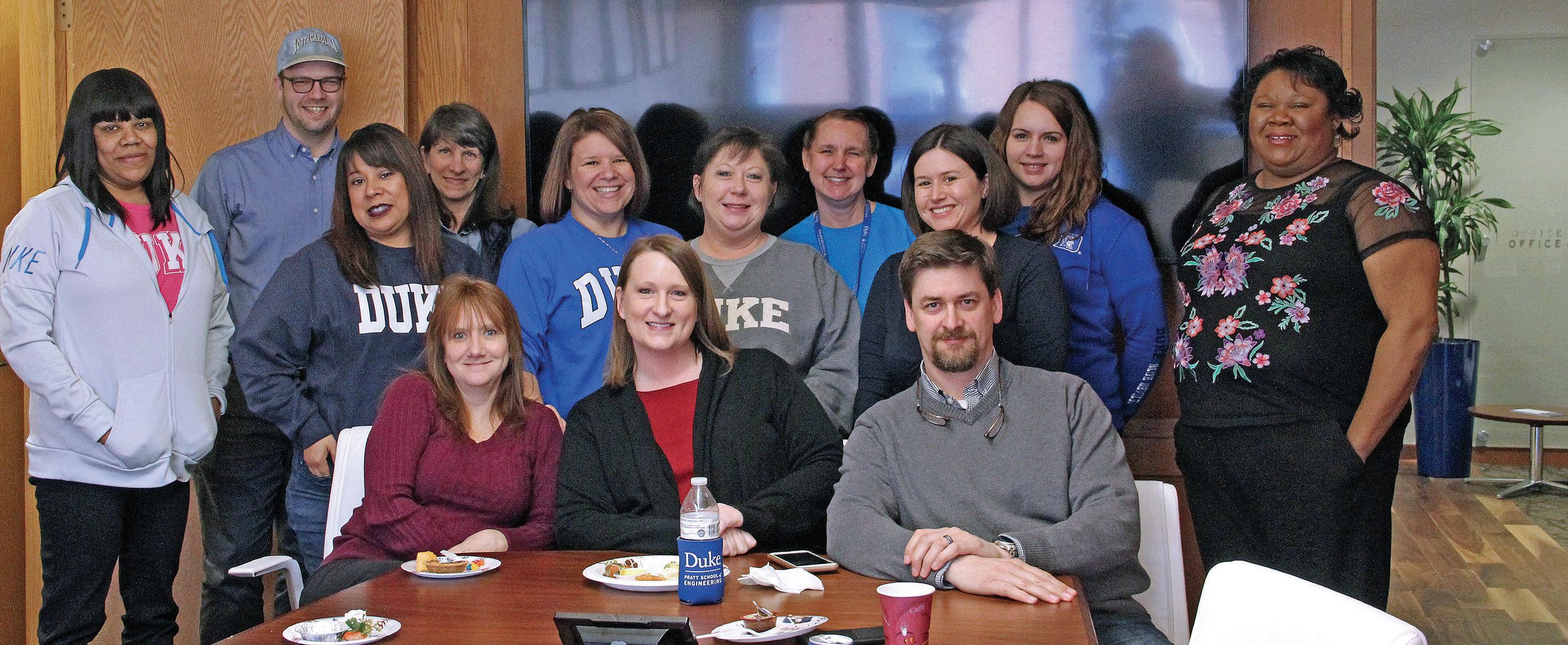
The event revived Pratt’s pre-pandemic tradition of lunchtime “tailgates” in anticipation of major sporting events. This one, which featured mini tacos and cakes and amateur analysis of the Blue Devils’ chances, allowed colleagues to bond.
Jim Morris, who had been hired as Pratt’s building coordinator roughly a year earlier, had mostly spoken with colleagues about ventilation hoods, burned-out lights, or room temperatures.
“I got to actually talk to people about what they did and what I did,” Morris said. “It was also fun to get to know people and understand where they’re coming from.”
Hemant Kakkar, an assistant professor at Duke’s Fuqua School of Business who studies management and organization, says a strong work culture forms when employees feel connected to one another and their employer. When that culture develops it leads to a more motivated and resilient workforce.
“You want to create a core identity, a sense that we are part of something together,” Kakkar said. “What that culture does is make people accountable to what they are doing. It gives them a sense of meaning, a sense of purpose, a sense that we are all in this together. When these come together, we find meaning in our work.”
In its 2022 Global Talent Trends report, “The Reinvention of Company Culture,” LinkedIn found that 40 percent of job seekers list “colleagues and culture” as a top priority when choosing a new job. Among the top ways employers can improve workplace culture are embracing flexible work arrangements,
building a diverse and inclusive climate, and encouraging professional development.
At Duke, these human-centered attributes are taking root.
In July of 2020, when Elissa Nickolopoulos and her fellow licensed clinical social workers at the Outpatient Clinic on North Roxboro Road returned to work in-person, she had plenty to get used to.
She had to figure out how to provide support to patients with mental and behavioral health concerns during a pandemic, and she was also adjusting to life as a mother.
With a three-month-old daughter at home, Nickolopoulos’ return to work complicated the balance between her work and family roles. But over the past two years, she has been grateful that her managers and colleagues provided the flexibility she’s needed to take care of both sides of her life.
Nickolopoulos said that when her daughter has had a sick day, or when daycare is closed due to COVID outbreaks, her team
The flexibility of Elissa Nickolopoulos’ team at the Outpatient Clinic on North Roxboro Road has allowed her to balance roles as a colleague, and mom to Isabella. Photo courtesy of Elissa Nickolopoulos.
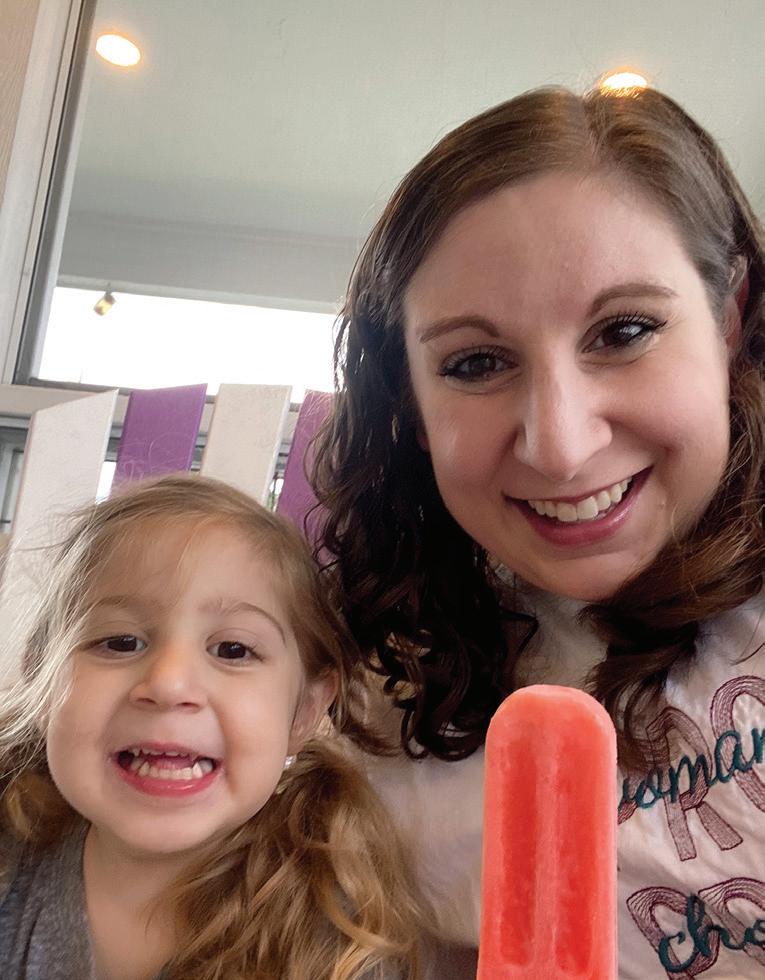
encouraged her to work from home. To Nickolopoulos, the acts are a sign that her team values the whole self, not just the work.
“We all have lives outside of work and sometimes we need to step away,” Nickolopoulos said. “Our department encourages us to do that.”
Whether with the small team she leads, or among colleagues in her larger unit, Duke University Health System Associate Compliance Officer Felice McNair knows that for teams to be successful, members must find common ground.
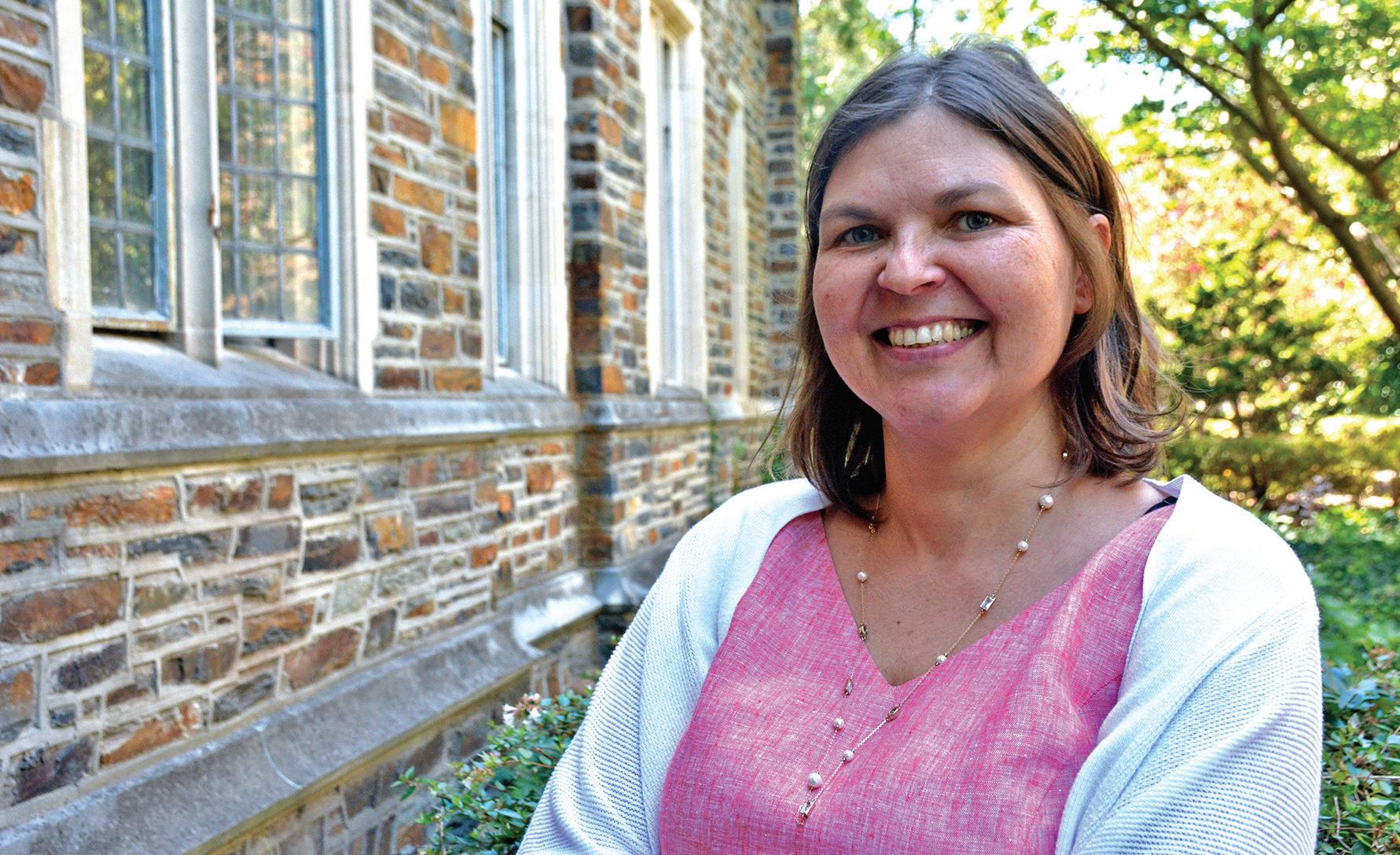
(L&OD), the health system’s “Moments to Movement” initiative against racism in all forms, and more.
She’s used lessons to inform productive conversations with her team about topics such as implicit bias and microaggressions.
“Workplace culture is showing respect to others in how they feel, beliefs and even how they express their thoughts,” she said. “We should be willing to listen and learn. Allow everyone to feel that they have a space.”
Before the pandemic, Irina Mokrova’s weekly Thursday team meetings were important, but not ironclad. If someone on the School of Medicine’s five-person Office of Research Development team had an urgent scheduling conflict, the 90-minute session might get called off.
Since going hybrid in March 2020, the now-Zoom-based meetings have become central to the team’s supportive culture. Led by Associate Dean Joanna Downer, the virtual gatherings feature discussions of life away from work where both happy moments and struggles are shared.
“We talk about our lives like humans,” said Mokrova, a senior research development associate. “We’re not just talking work; we’re talking about what’s really happening with us.”
As teams work at maintaining connections, for Mokrova’s group, honest and open meetings have strengthened personal and professional bonds.
In recent years, amid difficult conversations about race, politics, and the pandemic, the ability to forge connections on remote teams hasn’t been easy. But McNair said she’s been encouraged by how colleagues from different backgrounds are willing to put in work to maintain a climate of respect.
“We’re getting there,” said McNair, who joined Duke in 1997. “We’re moving forward.”
Diversity and inclusion are listed in the LinkedIn report among the top areas to invest to improve culture. For McNair, building an open and inclusive atmosphere has been a team effort involving both her department and close colleagues on the Professional Compliance Team. She has found helpful insights on communication and empathetic leadership from courses through Duke’s Learning & Organization Development
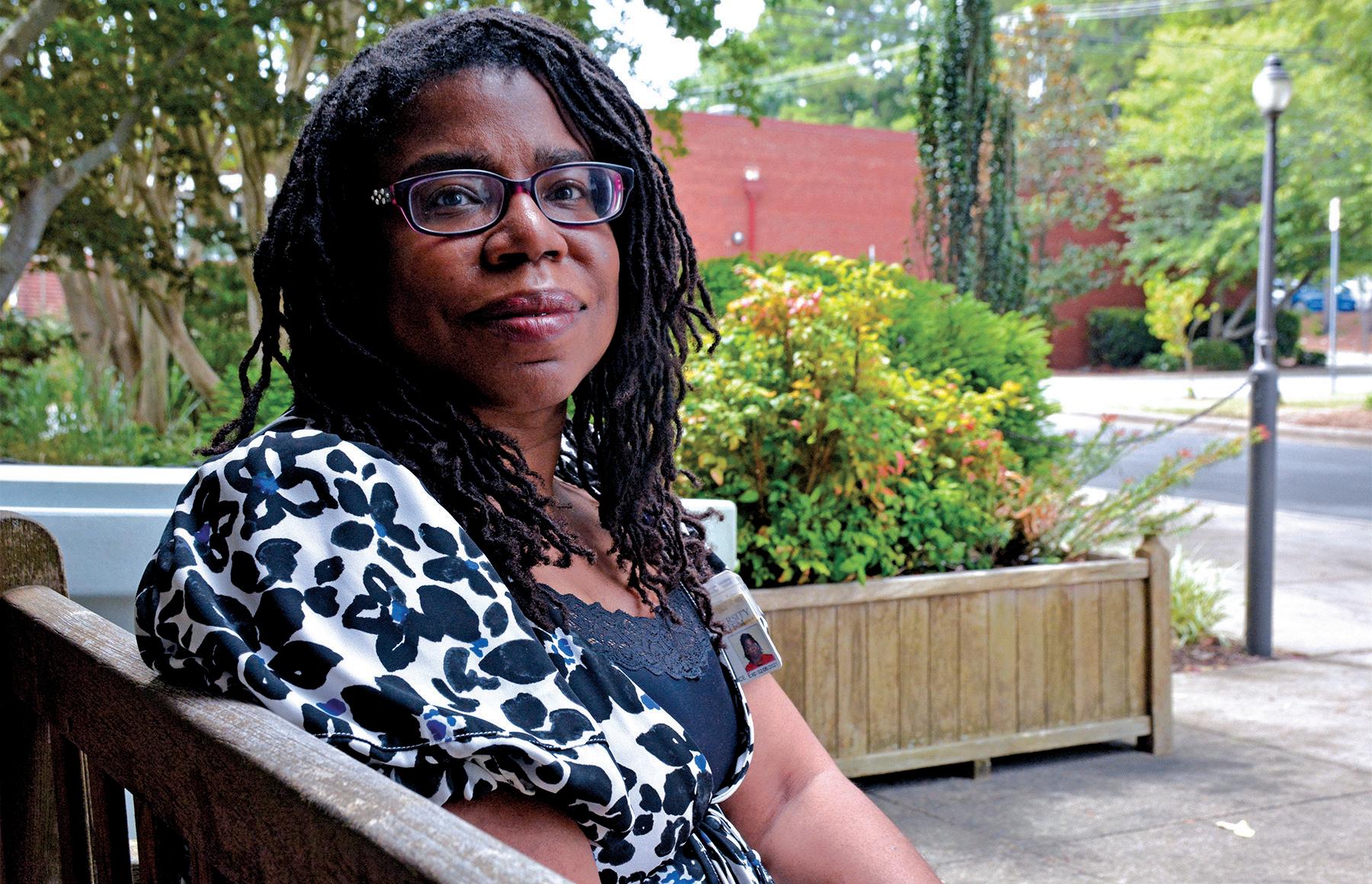
When conversation turns to shepherding faculty ideas through the grant application process, discussions of deadlines and workflows also include talk of team members’ bandwidth and balance, setting a tone where mention of hurdles is invariably followed by team members asking how they can help.

“I have worked at places where the culture was that you have your job, and you just have to do it,” Mokrova said. “For us, supporting each other is very important.”
As the post-pandemic work landscape evolves, Working@Duke will share stories of how individuals and schools, departments and units are building a positive culture at Duke. Send your story to working@duke.edu

New database will connect community with educational opportunities across campus
The results of the 2021 Duke Diversity, Equity and Inclusion Climate Survey identified a critical need for Duke to explore.


Duke students take
In the survey, 54 percent of staff, 51 percent of students and 45 percent of faculty listed active learning opportunities as a preferred method for enhancing the campus climate. Hearing that feedback, the Education Subcommittee of the Racial Equity Advisory Council (REAC) began working on what will become the University’s first searchable dashboard of educational engagement opportunities.
“Across the enterprise, folks understand racial equity work and creating an anti-racist Duke as their responsibility,” said Leigh-Anne Royster, assistant vice president for Diversity, Equity, and Inclusion in the Office for Institutional Equity (OIE) and co-chair of the Education Subcommittee. “One of the challenges with the work happening everywhere is that people may be unaware of what’s available to, and expected, of them or they may have a difficulty getting plugged in.”
This fall, the Education Subcommittee will begin a pilot as part of an inventory of institution-wide education and training efforts around racial equity. Four units will submit their available educational resources through a Qualtrics questionnaire to help build a dashboard of topics.
“We’ve got to understand what’s out there before we decide we want to fix anything,” said Hailey Mason, senior program coordinator for OIE and the Racial Equity Advisory Council.
The pilot will help inform the creation in 2023 of the searchable dashboard of trainings and curriculum from across Duke. Once the dashboard is complete, schools, departments, and units will be able to add offerings, and community members
Elsewhere on campus, a complementary mapping effort has helped health system employees connect with diversity, equity, and inclusion educational offerings. Earlier this year, as part of the Duke Clinical Enterprise Strategic Plan, the Duke Private Diagnostic Clinic (PDC), the physician practice of Duke Health, began working on a repository of 89 diversity, equity, and inclusion trainings available to health system employees.
Dr. Erica Taylor, orthopaedic surgeon and PDC’s associate chief medical officer of diversity, equity, and inclusion, said the teams used Microsoft Power BI, a data visualization program, to identify courses within Duke’s Learning Management System that are relevant to areas of diversity, inclusion, culture, equity, and belonging.
The repository provides insights into how often courses are used, or not, so leaders can determine what topics need to be emphasized. It also connects staff with topics that help them in their roles. For example, a clinical staff member may want strategies to address implicit bias after an interaction with a patient. Team leaders will be able to turn to the repository to offer that staff member educational options.
“This is an example of something that is real, that you can touch, feel and use,” said Taylor, who also serves on the infrastructure and policy committee of the Racial Equity Advisory Council. “To be clear, it is a tool; it’s not a solution. It is an approach to evaluating our current offerings that will help us make informed decisions about what we do from a long-term and short-term strategy to instill equity across the spectrum at Duke Health.”
By Jack Frederickitting in Scotland Memorial Hospital in Laurinburg, a town of roughly 15,000 near the South Carolina line, 56-year-old grandmother of six Debra Quick waited to talk with a doctor about her breast cancer diagnosis.

On this day in January 2022, Quick’s mind was far away, picturing graduations, weddings, and Christmases she feared she’d miss.
When Duke surgeon Dr. Hannah Woriax entered, she took Quick’s hand, smiled, and assured her they would defeat cancer together.
“She was my guardian angel,” said Quick, now cancer-free after surgery, radiation and chemotherapy.
While Woriax lives in Pembroke, roughly two hours from Durham, and sees patients in Robeson and Scotland counties, with “Duke Surgery” embroidered into her white coat, the Assistant Professor of Surgery is proud to be one of the many ways Duke touches lives across the state.
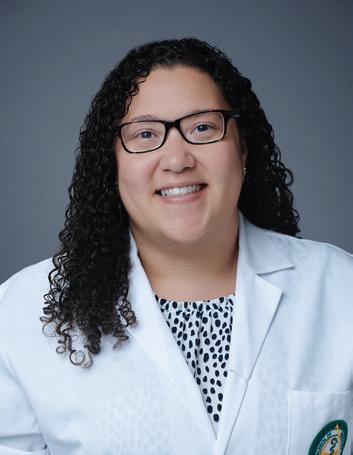
“People here deserve the best care possible, just like patients anywhere else,” said Woriax, who serves as a surgical oncologist for two rural cancer centers affiliated with Duke.
The scope of Duke University and Duke University Health System’s work in North Carolina was recently highlighted in a report from the Office of Duke State Relations. While Duke’s role in the Triangle is well-known, the report illuminated many ways the university and health system touch lives across the state.
Duke is North Carolina’s second-largest private employer. Around 34,000 Duke University alumni call North Carolina home and with its roughly 400 clinics and care locations, Duke University Health System serves patients in all 100 North Carolina counties.
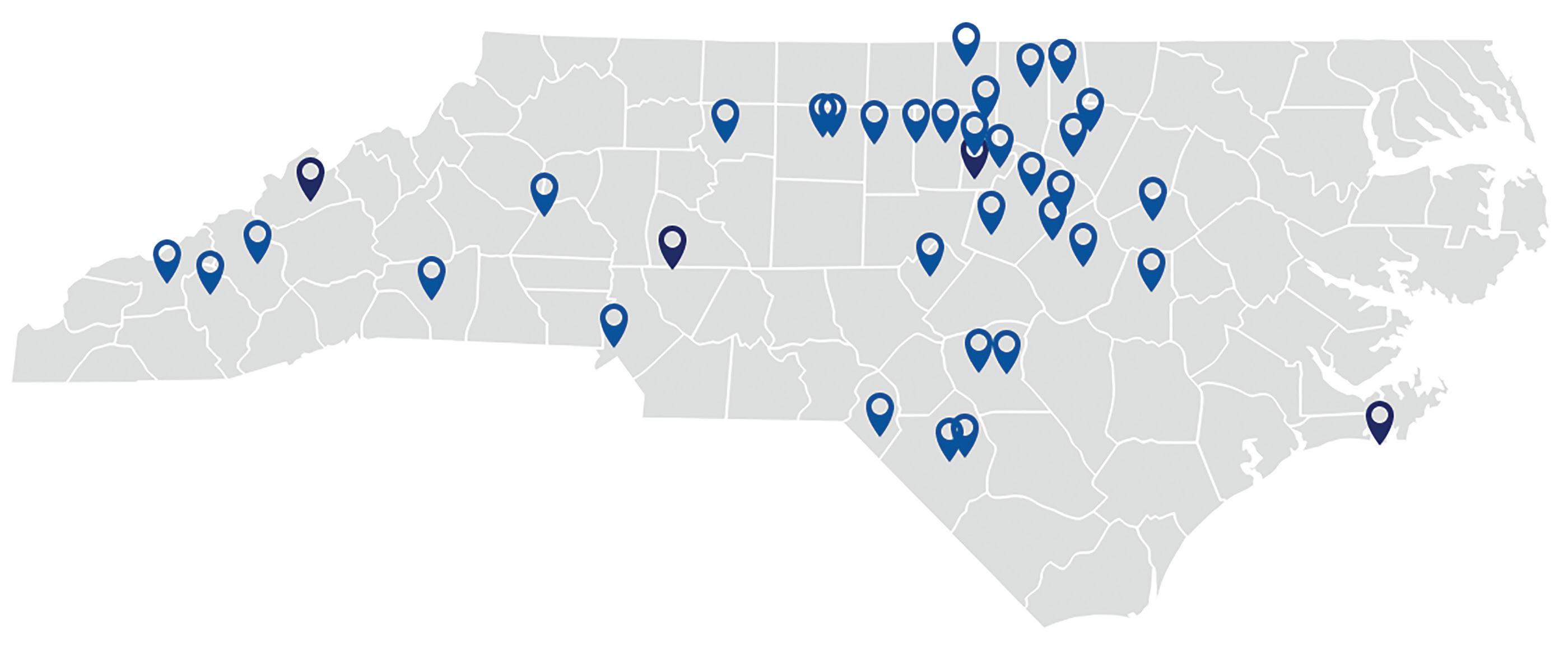
Since 1938, the Duke University Marine Lab has brought students and faculty to Beaufort to study the coast. And since 2009, Duke Clinical & Translational Science’s landmark MURDOCK Study has given researchers a comprehensive look at the diverse health needs of Cabarrus County residents.
From the Duke-Durham Neighborhood Partnership’s efforts advancing affordable home ownership and educational achievement in 14 Durham neighborhoods, to the Duke LifePoint Healthcare partnership, which connects Duke’s world class care to community hospitals in the central and western part of the state, Duke finds innovative ways to serve North Carolinians.
“This is what we’re all about,” said Associate Vice President Doug Heron, who leads the Office of Duke State Relations. “I’m continually impressed by the dedication of people at Duke and the work they do to improve lives in North Carolina.”
Savoring moments with her family far from Durham, breast cancer survivor Debra Quick is grateful to be one of those lives touched by Duke.
“I’d always heard about Duke and its great doctors,” Quick said. “My doctor was a shining light. She’s meant to do what she does.”
By Stephen SchrammAll of Tonya Durham’s workdays start the same way with a 6 a.m. call to the Duke Health Clinical Staffing Department’s employee hotline to hear that day’s assignment.
From there, her day – like everyone else’s in the department often called the nursing “float pool” – becomes its own, unique journey.
“I can go anywhere, and I have,” said Durham, who, since joining the float pool in 2016, has worked alongside nurses in Duke University Hospital’s Emergency Department, assisted with treatments at Duke Cancer Center, and sat with patients at Duke HomeCare and Hospice. “I feel like I’ve seen it all. I love having the freedom to help everywhere.”
Made up of roughly 535 clinical nurses, certified nursing assistants, behavioral health technicians and patient attendants, the float pool is where Duke University Health System’s three hospitals and many hospital-based clinics turn to fill temporary staffing needs.
With the need to adjust daily to new environments, colleagues and challenges, the float pool is home to some of the most adaptable and resilient employees at Duke.
“It takes a very particular kind of person to do what we do,” said Vanhphenh Kenmanivong, the Clinical Staffing Department’s operations director. “There are skills you can teach, but we also need things like strong communication and interpersonal skills, and being able to go with the flow.”
Formed in 2015 by merging separate float pools of Duke’s individual hospitals, the Clinical Staffing Department was a response to the growing volume and complexity of staffing needs at Duke University Health System. Now, managers contact the department when they know a team member might miss a shift, or if a spike in patient flow will require extra help.

“By building our internal resources, we can be sure to have the expertise and flexibility to move people around the system when they’re needed,” said Sylvia Alston, Duke University Health System’s assistant vice president for nursing who helped create the department.
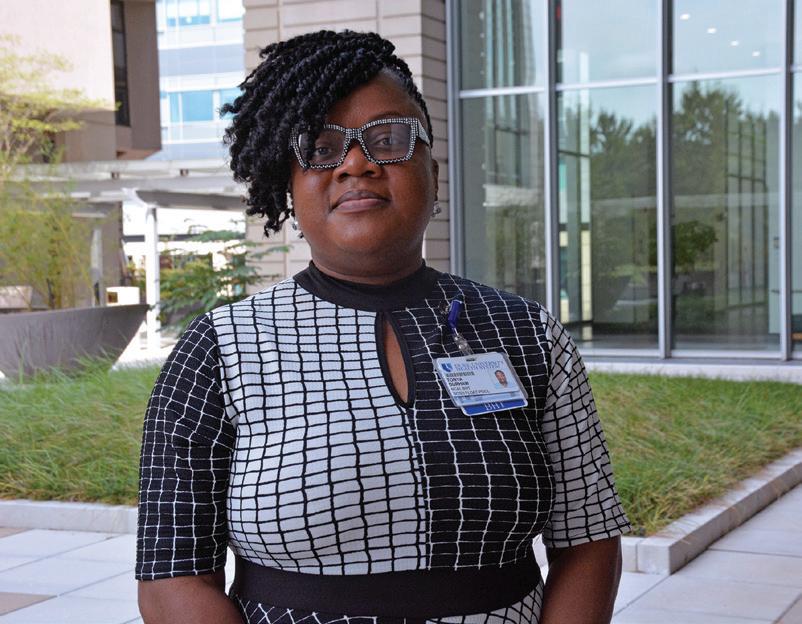
When the COVID-19 pandemic presented unique staffing challenges, the float pool rose to the occasion with members helping to run testing and vaccination sites and more.
As a longtime clinical nurse with the float pool, Jolly Ravi embraced the challenge of working during the pandemic with the same spirit of her shifts. To Ravi, and the float pool colleagues who share her perspective, each unpredictable day represents an opportunity to serve patients in new ways.
“I love this kind of work, it’s something new every day,” Ravi said. “I get to learn new things all the time. And I’m the kind of person who never wants to stop learning.”
By Stephen SchrammReceive
Over the summer, Dr. Jessica Sperling’s 10-year-old daughter, Eve Smokoski, wanted to write a song.
Using Taylor Swift music as the backdrop, Eve began researching and scribbling lyrics about Indonesia to the tune of Swift’s song, “Blank Space.”
“Indonesia’s where I’ve been / I can show you incredible things / Snorkels, flowers, islands, swim,” Eve’s lyrics read.
Eve was captivated by Indonesia after taking part in a singing activity about countries at a Durham Arts Council performing arts summer camp in 2021. Ahead of the next camp this past August, she began writing her own lyrics to music with time off from elementary school.
For the Sperling/Smokoski family, a 10 percent discount that all staff and faculty receive on adult and youth classes at the Durham Arts Council has helped Eve and sister, Liddy, chase their love for creativity. Over the years, they have attended art summer camps, piano lessons, and other workshops. It’s where Eve fostered her love of writing songs, and Liddy took an interest in visual arts.

“The staff who work there have always been really kind and warm, creative and fun, which is really a wonderful thing,” said Sperling, director of Applied Research, Evaluation, &
Engagement for the Duke Social Science Research Institute.
Founded in 1954, the Durham Arts Council [durhamarts.org] promotes access to, and love and support of, the arts through a variety of youth and adult classes, including pottery, visual arts, photography, graphic design, and more.

Registration for classes through December, such as ceramics, painting, stitching and calligraphy, is underway. The diversity of content is designed to help anyone, no matter age or skill level, discover artistic passions.
The recent summer camp became an outlet for Eve to continue to write songs, and this past summer, she shared the song lyrics about Indonesia with Durham Arts Council camp organizers. It was the first song she has shared beyond family.
Camp organizers loved it, and during camp, she and other campers practiced the lyrics in anticipation of the first public performance of Eve’s song. On the final afternoon in August, Eve and other campers sang the song together over an instrumental for their families. When it comes to fostering a love for expression, the Sperling family will continue to turn to the Durham Arts Council for inspiration.
“The activities they do seem to be really fun and engaging,” Sperling said. “My kids always really love it.”
By Jack Frederick





Sept 6
#COVID19 affected sleep patterns in 4 of 10 people. In this @WorkingatDuke article, Duke team members & #sleep expert Dr. Sushrusha Arjyal of Duke Psychiatry & @Duke_Neurology share a few ideas for regaining control of your sleep. ow.ly/Ogqb50KjQzL @DukeMedSchool

Staff and faculty receive 15 percent off all shows.
today.duke.edu
Prior to the COVID-19 pandemic, Dr. Hunter Spotts, assistant professor of Family Medicine & Community Health and medical director of ...
Get a Free Flu Vaccine Vaccinations are available at various campus clinics.




Each live session focuses on nutrition, fitness, or mental health.
